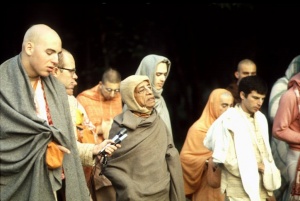CC Madhya 22.26 (1975)

A.C. Bhaktivedanta Swami Prabhupada
Below is the 1996 edition text, ready to be substituted with the 1975 one using the compile form.
TEXT 26
- cāri varṇāśramī yadi kṛṣṇa nāhi bhaje
- svakarma karite se raurave paḍi’ maje
SYNONYMS
cāri varṇa-āśramī—followers of the four social and spiritual orders of life; yadi—if; kṛṣṇa—Lord Kṛṣṇa; nāhi—not; bhaje—serve; sva-karma karite—performing his duty in life; se—that person; raurave—in a hellish condition; paḍi’—falling down; maje—becomes immersed.
TRANSLATION
“The followers of the varṇāśrama institution accept the regulative principles of the four social orders [brāhmaṇa, kṣatriya, vaiśya and śūdra] and four spiritual orders [brahmacarya, gṛhastha, vānaprastha and sannyāsa]. However, if one carries out the regulative principles of these orders but does not render transcendental service to Kṛṣṇa, he falls into a hellish condition of material life.
PURPORT
One may be a brāhmaṇa, kṣatriya, vaiśya or śūdra, or one may perfectly follow the spiritual principles of brahmacarya, gṛhastha, vānaprastha and sannyāsa, but ultimately one falls down into a hellish condition unless one becomes a devotee. Without developing one’s dormant Kṛṣṇa consciousness, one cannot be factually elevated. The regulative principles of varṇāśrama-dharma in themselves are insufficient for attainment of the highest perfection. That is confirmed in the following two quotations from Śrīmad-Bhāgavatam (11.5.2-3).